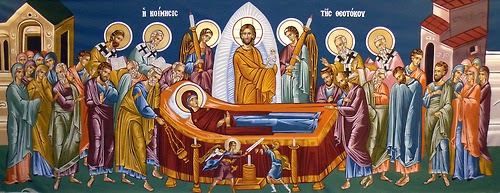Martin Thornton (1915-1986), a priest in the Church of England, was a leading Anglican spiritual writer of the 20th century. He wrote a number of books including Anglican Spirituality and The Heart of the Parish: a theology of the remnant. He stressed the importance of individual Christians developing a rule of life, based upon the Eucharist, some version of the Daily Office, and private devotion or contemplative prayer. In this essay, excerpted below, Matthew Dallman discusses several of Thornton's insights into the Office.
++++++++++++++++++++++++++++++++++++++++++++++++++++++++++++++++++++++++++
1) The Our Father prayer is the sole domenical basis for the Office; it establishes its corporate nature, its teleology, its disposition, its paradigm. The Didache confirms its centrality to corporate set prayer.
2) The Office can only be understood theologically within the larger theology of Regula-Office-Mass-Devotion--which is the ascetical application of the doctrine of the Trinity: Office associates with the Father, Mass with the Son, and Devotion with the Spirit.
3) The Office is objective praise to the Father by the Body of Jesus...Sanctification of time is by our attentiveness to the abundant activity of the Holy Spirit...
4) Sober assessment of the pastoral situation today must conclude that the reason few people do the Office likely stems from the fact that the authorized Anglican Office today was crafted for a late-medieval society...The Anglican Office has rightly endured as a Benedictine inheritance, yet now reform is necessary.
5) ...The ideal is memorization of the Office, and no books.
++++++++++++++++++++++++++++++++++++++++++++++++++++++++++++++++++++++++++
1) The Our Father prayer is the sole domenical basis for the Office; it establishes its corporate nature, its teleology, its disposition, its paradigm. The Didache confirms its centrality to corporate set prayer.
2) The Office can only be understood theologically within the larger theology of Regula-Office-Mass-Devotion--which is the ascetical application of the doctrine of the Trinity: Office associates with the Father, Mass with the Son, and Devotion with the Spirit.
3) The Office is objective praise to the Father by the Body of Jesus...Sanctification of time is by our attentiveness to the abundant activity of the Holy Spirit...
4) Sober assessment of the pastoral situation today must conclude that the reason few people do the Office likely stems from the fact that the authorized Anglican Office today was crafted for a late-medieval society...The Anglican Office has rightly endured as a Benedictine inheritance, yet now reform is necessary.
5) ...The ideal is memorization of the Office, and no books.












